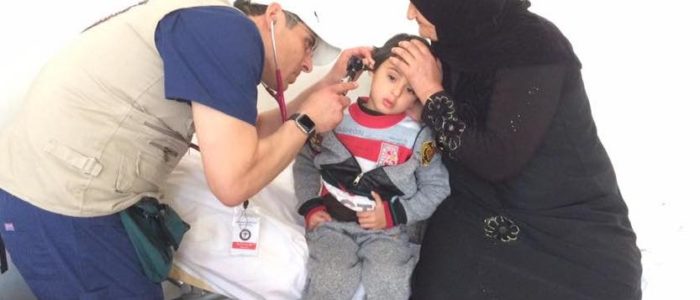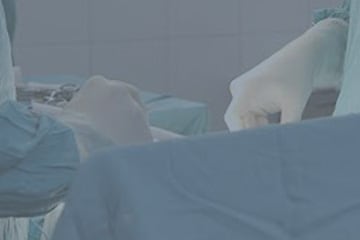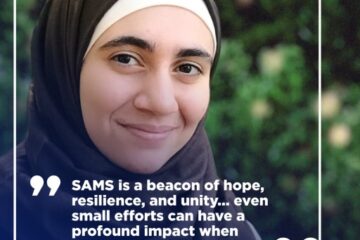April 9, 2017
The day began at 4:50 am. It took me 36 hours, but I’m more or less over jet lag and I was grateful for 4 hours of sleep.
The first day of the mission is full of nervous energy, making sure that all of the different providers and teams are best situated. After a quick shower and call home to my wife, I ran downstairs to see off the neurosurgical team of Dr. Khalid Kurtom, which was scheduled at 5:45 for departure to the hospital. (The team left on time, and with the exception of a short lunch break worked straight through with surgeries until 7pm tonight – the first time that we have performed surgical procedures on the first day of a mission.)
The rest of our volunteers made their way down to breakfast at 6:30 am, and then to the pharmacy room at 7am to pick up donated medications. (As a pediatrician, for me this means antibiotics, antipyretics (acetaminophen, ibuprofen), and rehydration solutions.) By 7:30 am, the rest of the teams left for varied points – orthopedic surgery triage at the hospital, local clinics in Amman, the Zaatari and Azraq refugee camps, and finally to the city of Mafraq, where I accompanied the team for my first visit.
We arrived at 9 am, and like most of our clinics our presence was well advertised; we were greeted by a full waiting room waiting to see a neurologist, internist, and me. Two years ago, my first visit to a similar clinic was jarring, seeing child after child for hours. This time, I had a modicum of confidence; I let our nurse work with the other physicians, and saw the children on my own.

On the drive down to the clinic, one of the translators asked me why I decided upon pediatrics for a career. The reason, I told him, was that pediatrics, medically speaking, is like orthopedic surgery – just without the surgical part. Older patients like myself develop chronic problems that multiply over time and inevitably worsen. Children, however, bounce back and heal with treatment – and like an orthopod, I like to “fix” my patients and watch them recover.
Today, I saw patients whom I couldn’t fix.
I saw a 16 year old boy whose body was been winnowed down by cancer. Barely a hundred pounds, his mother brought in the results of previous laboratory tests and studies. Ewing’s Sarcoma, the diagnosis read, and the studies indicated metastases to the spine. By definition, this meant the disease is stage 4, which has a 15 to 30% survival rate if prompt treatment is available. I examined him, evaluated his cough, and took his essential data to pass along for referral. Unfortunately, as a refugee his access to advanced care is almost nil, and his odds of survival are correspondingly low.
I saw 10 and 12 year old brothers, whose bodies appear to be those of 7 and 9 year olds. The parents had been able to afford laboratory testing on the oldest, and they indicated growth hormone and thyroid deficiencies; likely, his brother has the same medical challenges. While they are stable, treatment of childhood growth hormone deficiency is in all probability beyond the reach of their parents.
In 7 hours, I saw 51 children and one young adult. For most, my care did matter, whether I was treating viruses, ear infections, muscle pains, or pneumonia; I made most kids smile with my “squeak toy” trick of making funny sounds as I pressed their bellies. But it’s these 3 children who remain with me tonight, as they will tomorrow when I submit their information to SAMS. They did not choose to become refugees, and it will haunt me that a war they know nothing about has fettered them to their apparent fates.
Our team of volunteers worked hard today at every level, and are forging new relationships and impressions with their patients as well as with each other. Tomorrow, I go to a clinic here in Amman. Thank you all for your support.
-Jihad
Pediatrician Dr. Jihad Shoshara is leading the current SAMS Medical Relief mission to Jordan from April 7 – April 14. The mission will provide care to Syrian refugees and the local Jordanian community, focusing on pediatric orthopedics and neurosurgery, a first time for our Jordan missions. We will be providing 50 surgeries in just five days. Dr. Jihad Shoshara, a pediatrician from Chicago, will be sharing live updates with us every day.



